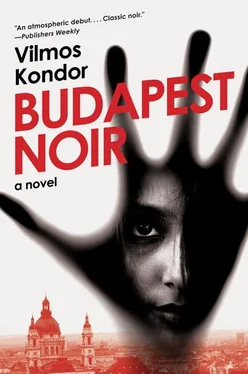After they parked on Lövölde Square, Krisztina turned to Gordon. “Wait for me here. You don’t need to come up, Zsigmond. I’ll hurry.” Czövek opened the door for her, and as she exited, she lit a cigarette. Gordon leaned back and shut his eyes. The trip wasn’t a short one to begin with, and it would feel even longer with Krisztina in such a merry mood. But he didn’t blame her.
He opened his eyes a few minutes later at the sound of the door slamming shut. Krisztina sat down next to him, and Czövek slipped back in behind the wheel. “And where are we going now?” he asked. “Back to Lovag Street?”
“To that little resort village up in the Bükk mountains. Lillafüred, to be precise—the Palace Hotel.”
Czövek gave a quiet whistle, adjusted his driver’s cap, and backed the big, bulky car out onto the street. He then drove down Andrássy Street toward Heroes’ Square. From Arena Road he turned onto Kerepesi, which would take them to Route 3. Gordon looked at the speedometer. Sixty kilometers an hour. Glancing at his watch, he calculated that at best they’d arrive at 6 P.M., if not later.
The buildings gradually grew sparser along the road, and Gordon shuddered. Leaving Pest, even if that only meant venturing to the city’s outskirts, invariably gave him an unpleasant feeling. He couldn’t say why. It was as if he’d wound up in another world. A foreign world whose rules he could only guess at. If he’d had the choice, he wouldn’t leave Pest. Gordon had not spoken of this even to Krisztina, though he suspected that she knew.
As the buildings became ever more tattered and the side roads looked muddier, Gordon felt worse. Until, that is, they had left the city altogether. Now he breathed a sigh of relief, even if he did continue to look out on the flat landscape with suspicion—small villages nestled off in the distance, dense woods, cheerful little towns. One such town was Gödöllő, where Gordon had been once before. Indeed he’d even gotten into the Grassalkovich mansion, the residence of the head of state, Miklós Horthy. The Evening had sent him to a reception there whose guests included several American diplomats. What with its otherworldly elegance, the mansion made a good impression on Gordon—certainly a better one than did the other people on hand. The Budapesters rode astride the high horse of their big city airs, and those from outlying regions couldn’t have stripped away their stale provincialism for all the treasures in the world. This only confirmed Gordon’s feeling that he was indeed in a different land.
“I said you should buy a car,” said Krisztina, who was likewise looking out at the countryside.
“Furthest thing from my mind,” replied Gordon.
“But there was that pretty little Graham-Paige. It cost just eight hundred pengős.”
“Where would I go with a car?”
“Right now, for instance, you’d go to Lillafüred, with me.”
“And I was supposed to buy a car for that? To take you to Lillafüred?”
Krisztina looked at him and shook her head, but didn’t reply.
“Besides,” Gordon added, “I don’t have the nerves to drive in Budapest.”
Krisztina turned back to the window. Only when they reached the vicinity of Gyöngyös—the town wedged between the northern edge of the plains and the foothills of the Mátra range, and whose proximity signaled that they had at last arrived in the mountainous north—did she speak again.
“Will you tell me finally what this is all about? Or do you want to keep playing the part of the cloak-and-dagger detective?”
“Of course,” said Gordon, “of course.”
“Then tell me. We have plenty of time yet.”
“The dead girl was called Fanny Szőllősy,” Gordon began. “She was the daughter of the owner of Arabia Coffee, his only child. Just how she ended up in the hands of Csuli, I don’t yet know; which is to say, I know, but I don’t know how things got that far. She was in love with Shlomo, the son of a rabbi, Rav Shay’ale Reitelbaum. I suspect it was the young man who got her pregnant, and then somehow word got out, whereupon the rabbi put his son on a ship to New York.”
“And how did Fanny end up on the streets?”
“That I do not know.”
“Did her father kick her out?”
“I don’t know, Krisztina, but I believe the answer lies at our destination,” he replied, filling her in on what he’d learned from the Szőllősy family’s maid. And, of course, from the coffee merchant’s wife.
“So the reason we’re headed to this charming little resort tucked in the mountains,” observed Krisztina, “is to have a chat with the former maid, Teréz Ökrös, in her nearby village of Bükkszentkereszt.”
“And because you’ve been wanting to come here for a while,” said Gordon.
“Zsigmond, there’s no sense mixing up the two. We’re coming because you have business here. And not for my pleasure.”
“And because I didn’t want you to stay in Budapest,” Gordon added. “I don’t think you’re safe there just now.”
“You’re worried about me?” asked Krisztina, raising her eyebrows.
“Yes, you.”
Krisztina didn’t say anything. For a couple of moments she was lost in thought. “What do you figure this is all about?”
Gordon shook his head. “I don’t know, Krisztina. I only have a hunch.”
“What’s that?”
“Something bad. I really hope what happened is not what I think.”
“What do you think happened?”
“You don’t want to know,” Gordon replied.
“But I do want to know. It’s you who doesn’t want to tell me.”
“I can’t tell you, because I’m not sure about it yet. I’ll tell you everything once I’ve gotten to the bottom of it.”
“And when will that be?”
“I don’t know. Maybe a couple of days. This week.”
“This week,” said Krisztina with a brooding look. “Now that you mention it, I almost forgot. I have to give Penguin an answer this week.”
“I know; I haven’t forgotten.”
“Fine, then.”
It was well past six by the time they arrived in Miskolc, that bustling northern city at the edge of the Bükk range. Lillafüred was not far. Czövek drove with confidence along the windy mountain road that led to the lakeside hotel, as if he’d been here more than once.
Night had fallen. Only sometimes did they see the glimmering lights of a car approaching from the opposite direction or had to swerve to avoid a stray knapsack-equipped tourist trudging along. They stopped at the mountain railway crossing, for the charming little tourist train just happened to be chugging by, children’s faces pressed against the glass of the cars as their parents sat wearily beside them. In the distance shone the lights of the Palace Hotel.
Gordon stared in silence at the building bathed in light on the shore of Lake Hámori. Ever since he’d first seen this sumptuous architectural masterpiece back in 1931, he didn’t understand just what it was doing here. Even then, of course, he’d come here to work, but he couldn’t fail to notice both the storybook beauty of this palace and, indeed, its utterly anachronistic nature. Such palaces were owned by ancient German families; centuries ago, their rooms played host to conversing kings, knights, and princesses. And generations lived and died in the village that stretched out below. Then the kings and princes gave way to modernity, and slowly but surely the palaces were gnawed by time. And then there was this building, which arose here hardly six years earlier, ostensibly with the aim of serving as a hotel. Built in the style of something right out of the Middle Ages, from the era of Hungary’s fabled King Matthias. Gordon reflected on all this as he looked up at the imposing structure. The car now made its way alongside Szinva Creek, turning and, finally, coming to a stop in front of the hotel.
Читать дальше
Конец ознакомительного отрывка
Купить книгу












